Commentary: Investing in health for Filipinos

As Filipinos, we have weathered countless calamities, emergencies and challenges. In the process, we have shown how our patience, resilience, and sense of community have helped us make it through any challenge thrown at us.
On the flipside though, these usually good Filipino traits become bad when approached through the lens of care-seeking behavior. This is because instead of consulting with a doctor when we get sick, Filipinos are more likely to tolerate their symptoms and try to fight through it with support and advice from friends and family.
In fact, according to a World Health Organization survey, Filipinos show a high percentage of self-treatment, with over half of the medications taken during an acute illness either self-prescribed or prescribed by non-health professionals.
The same study also showed that Filipinos often put off elective medical and surgical conditions until the situation worsens and requires hospitalization. And even then, the decision to be hospitalized is made together with family and friends.
The underlying reason for this peculiar care-seeking behavior though is not some cultural trait, nor is it due to religious beliefs— it’s economic. For many Filipinos the decision to seek medical care is decided solely by a household’s ability to pay.
Due to the lack of universal health insurance, Philippine households paid 53.9% of health expenses out-of-pocket in 2018, much higher than the global average of 18.2% that same year. So, for too many poor or underemployed Filipinos, seeing a doctor is an option they simply cannot afford.
Likely, it is even less of an option now because of COVID-19. This pandemic has revealed the long-existing cracks in our country’s healthcare system, but it has also exposed our weakness—our low care-seeking behavior— and played directly to it.
Just look at the list of its symptoms according to WHO, the most common ones are fever, tiredness and dry cough. Some patients also experience aches and pains, nasal congestion, runny nose or a sore throat. These are all symptoms a Filipino parent would usually solve with some Vicks VapoRub, White Flower oil, or Tiger balm, and not a visit to your doctor or your local health center.
Mentholated ointments aside, the underlying issue here is that the overwhelming cost of out-of-pocket health expenses for Filipino households has caused them not to seek care when they should. A behavior that is all the more dangerous now that we face a contagious virus with such a drawn-out incubation period.
Key to changing this behavior, fighting COVID-19, and improving the health of the Filipino people is the implementation of landmark health laws, such as the Universal Health Care (UHC) Act and the National Integrated Cancer Control Act (NICCA). Under the UHC Act, every Filipino is entitled to health coverage and can expect lower out-of-pocket expenses. The NICCA, on the other hand, reduces the burden on families and cancer patients.
Both laws were passed early last year, however, both were not implemented due to the Department of Health’s lack of preparedness and funding in the 2020 national budget. The fear is it could happen again in 2021.
I understand government funding must be tight because of the pandemic, but with the direct impact these laws will have on Filipino’s care-seeking behavior and on their out-of-pocket burden, the implementation of both laws would drastically improve the provision of financial risk protection, delivery of health services and, most important, save lives. After all, the country’s ballooning loans should be put primarily towards improving its healthcare system.
In addition to providing Filipinos with financial risk protection, there are more ways the government can further change the care-seeking behavior of Filipinos. For example, due to the community quarantine and social distancing practices, the DOH should more aggressively promote and support doctors and hospitals that offer online consultations and other eHealth services.
There are approximately 74 million smartphone users in the Philippines, each with the potential to access eHealth services. This is yet another reason to strengthen our healthcare system with cloud-based technologies that would enable Filipinos to wirelessly receive on-demand health services anywhere and anytime.
However, all this talk of eHealth presumes the availability and reliability of internet access. But the years of bureaucratic red tape and excessive permitting processes have slowed the expansion of cell towers in high demand urban areas. On the other hand, in rural areas, access to quality healthcare remains in short supply and with many still unconnected, access to eHealth services is also limited.
Government must breakdown policy roadblocks, prioritize investment and, in partnership with telecommunication firms, develop our digital infrastructure and last-mile connectivity. This would ensure that more Filipinos gain access to the internet and to quality healthcare that would have otherwise been out of their reach.
Our patience, resilience and sense of community are not enough to get us through this pandemic. We cannot just wait patiently for a vaccine, even if the president has pleaded with China to prioritize us.
The Philippines has to take steps towards improving its own healthcare system and the attitudes of its citizens toward seeking care. It can do just that through the promotion of eHealth and the full implementation of laws that reduce the burden on Filipino families, like the UHC Act and NICC. The Filipino people’s health is an investment, not an expense.
Paco Pangalangan is the executive director of think tank Stratbase ADR Institute.
- Latest


























